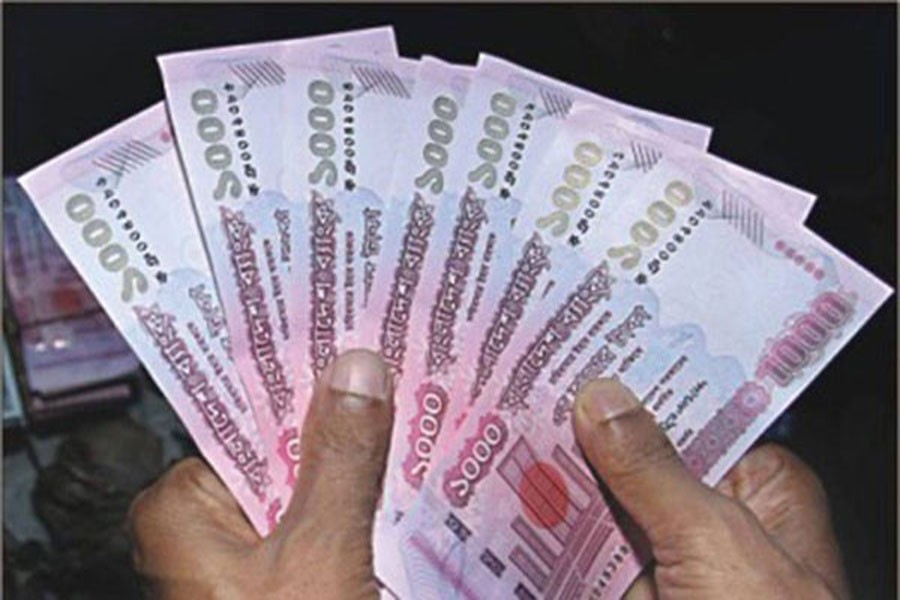
Published :
Updated :

The government restarted borrowing from the banking system, ending over a month's suspension, through auctioning its securities for part financing of budget deficit.
Exigencies of food import following crop losses and repairs of flood-damaged infrastructures, especially roads, are also seen as expedients for resuming the government bank borrowing.
As part of the latest moves, the government borrowed Monday Tk 15 billion from banks by issuing 91-Day and 364-Day treasury bills (T-bills) at auctions held at the central bank headquarters in Dhaka.
It borrowed at cut rates of yield, generally known as interest. The rate on 91-Day T-bills came down to 3.97 per cent on the day from 4.01 per cent of the previous auction held on July 17.
On the other hand, the pared-down yield on 364-Day T-bills stood at 4.43 per cent in a fall from 4.47 per cent of the previous auction held on July 10, according to the auction results.
The interest rate on T-bills fell slightly on the day as the commercial banks rushed to offer their bids in auctions, according to a senior treasury official of a leading private commercial bank (PCB).
He also said the banks are now interested to invest their excess liquidity in the risk-free government securities to minimise their cost of fund.
Meanwhile, the volume of excess liquidity rose to Tk 1.10 trillion as on July 20 last from Tk 1.06 trillion in the last week of June, according to the central bank officials.
However, excess reserves, generally known as excess over daily minimum cash reserve requirement (CRR) with the central bank, rose to around Tk 50 billion during the period under review from Tk 45 billion.
According to the auction calendar, issued by the Bangladesh Bank (BB) earlier, the government borrowed Tk 10 billion issuing 91-Day T-bills while the rest came from the 364-Day T-bills.
The government is set to borrow Tk 78 billion in the month of September through issuing or re-issuing Bangladesh Government Treasury Bonds (BGTBs) and T-bills to meet its ongoing budget deficit partly.
"Actually, government's net borrowings from the banking system will be zero by the end of this month after making repayment of same amount against maturities of its securities," said a senior official familiar with the government debt- management activities.
The government may borrow more by holding auction of 14-Day T-bills to meet its immediate expenses, the official hinted. He also said the exchequer had already started borrowing from ways and means advances (WMAs) facility.
Currently, the government is empowered to borrow up to Tk 40 billion from the central bank under the WMAs to meet its day-to-day expenditures without issuing any securities.
Talking to the FE, another official said the government borrowings from the banking system may increase in the coming months for meeting its budgetary expenses alongside reconstruction of 7130 kilometres of flood-hit roads in 21 districts across Bangladesh.
He also said higher import of food-grains, particularly rice, may also push up the government bank borrowings in the near future.
The government and the central bank have already relaxed policies to encourage rice import to cater a growing market demand.
The Ministry of Finance earlier had suspended its fresh borrowing from the banking system through cancelling auctions of its securities since July 23 till August 31 for ensuring proper cash management.
Besides, the government injected around Tk 20 billion into the market through making payments against maturity of the BGTBs in August, according to the officials.
Currently, four T-bills are transacted on auction to adjust government borrowings from the banking system. The T-bills have 14-day, 91-day, 182-day and 364-day maturity periods.
The T-bills are short-term investment tools issued through auctions, conducted by the central bank on behalf of the government.
Furthermore, five government bonds, with tenures of 02, 05, 10, 15 and 20 years respectively, are traded on the money market.
siddique.islam@gmail.com


 For all latest news, follow The Financial Express Google News channel.
For all latest news, follow The Financial Express Google News channel.